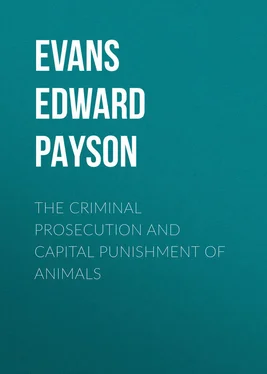Edward Evans - The Criminal Prosecution and Capital Punishment of Animals
Здесь есть возможность читать онлайн «Edward Evans - The Criminal Prosecution and Capital Punishment of Animals» — ознакомительный отрывок электронной книги совершенно бесплатно, а после прочтения отрывка купить полную версию. В некоторых случаях можно слушать аудио, скачать через торрент в формате fb2 и присутствует краткое содержание. Жанр: foreign_antique, foreign_prose, на английском языке. Описание произведения, (предисловие) а так же отзывы посетителей доступны на портале библиотеки ЛибКат.
- Название:The Criminal Prosecution and Capital Punishment of Animals
- Автор:
- Жанр:
- Год:неизвестен
- ISBN:нет данных
- Рейтинг книги:5 / 5. Голосов: 1
-
Избранное:Добавить в избранное
- Отзывы:
-
Ваша оценка:
- 100
- 1
- 2
- 3
- 4
- 5
The Criminal Prosecution and Capital Punishment of Animals: краткое содержание, описание и аннотация
Предлагаем к чтению аннотацию, описание, краткое содержание или предисловие (зависит от того, что написал сам автор книги «The Criminal Prosecution and Capital Punishment of Animals»). Если вы не нашли необходимую информацию о книге — напишите в комментариях, мы постараемся отыскать её.
The Criminal Prosecution and Capital Punishment of Animals — читать онлайн ознакомительный отрывок
Ниже представлен текст книги, разбитый по страницам. Система сохранения места последней прочитанной страницы, позволяет с удобством читать онлайн бесплатно книгу «The Criminal Prosecution and Capital Punishment of Animals», без необходимости каждый раз заново искать на чём Вы остановились. Поставьте закладку, и сможете в любой момент перейти на страницу, на которой закончили чтение.
Интервал:
Закладка:
The Bishop of Bamberg in Bavaria has been stigmatized as a hypocrite because he sends the infirm of his flock on a pilgrimage to Lourdes or Laas or some other holy shrine, while he prefers for himself the profane waters of Karlsbad or Kissingen. But in so doing he is not guilty of any inconsistency, since a journey to sacred places and contact with sacred relics would not act upon him with the same force as upon the ignorant and superstitious masses of his diocese. His conduct only evinces his disbelief in the supernatural character of the remedies he prescribes. The distinguished French physician, Professor Charcot, as already mentioned, recognized the curative power of faith under certain circumstances, and occasionally found it eminently successful in hysterical and other purely nervous affections. In some cases he did not hesitate to prescribe a pilgrimage to the shrine of any saint for whom the patient may have had a peculiar reverence; but in no instance in his experience did faith or exorcism or hagiolatry heal an organic disease, set a dislocated joint or restore an amputated limb. What Falstaff says of honour is equally true of faith, it “hath no skill in surgery.”
But to return from this digression, Père Bougeant’s theory of the diabolical possession of pagans and unbaptized persons would provide for comparatively few devils, and the gradual diffusion of Christianity would constantly diminish the supply of human beings available as their proper habitations. The ultimate conversion of the whole world and the custom of baptizing infants as soon as they are born would, therefore, produce serious domiciliary destitution and distress among the evil spirits and set immense numbers of them hopelessly adrift as vagabonds, and thus create an extremely undesirable diabolical proletariat. This difficulty is avoided by assuming that the vast majority of devils are incarnate in the billions of beasts of all kinds, which dwell upon the earth or fly in the air or fill the waters of the rivers and the seas. This hypothesis, he adds, “enables me to ascribe to the lower animals thought, knowledge, feeling, and a spiritual principle or soul without running counter to the truths of religion. Indeed, so far from being astonished at their manifestations of intelligence, foresight, memory and reason, I am rather surprised that they do not display these qualities in a higher degree, since their soul is probably far more perfect than ours. Their defects are, as I have discovered, owing to the fact that in brute as in us, the mind works through material organs, and inasmuch as these organs are grosser and less perfect in the lower animals than in man, it follows that their exhibitions of intelligence, their thoughts and all their mental operations must be less perfect; and, if these proud spirits are conscious of their condition, how humiliating it must be for them to see themselves thus embruted! Whether they are conscious of it or not, this deep degradation is the first act of God’s vengeance executed on his foes. It is a foretaste of hell.”
Only by such an assumption, as our author proceeds to show, is it possible to justify the ways of man to the lower animals and to reconcile his cruel treatment of them with the goodness of an all-wise and all-powerful maker and ruler of the universe. For this reason, he goes on to explain, the Christian Church has never deemed it a duty to take the lower animals under its protection or to inculcate ordinary natural kindness towards them. Hence in countries, like Italy and Spain, where the influence of Catholicism has been supreme for centuries, not only are wild birds and beasts of chase relentlessly slaughtered and exterminated, but even useful domestic animals, asses, sumpter-mules and pack-horses, are subjected to a supererogation of suffering at the hands of ruthless man. As the pious Parsi conscientiously comes up to the help of Ahuramazda against the malevolent Angrô-mainyush by killing as many as possible of the creatures which the latter has made, so the good Catholic becomes an efficient co-worker with God by maltreating brutes and thus aiding the Almighty in punishing the devils, of which they are the visible and bruisable forms. Whatever pain is inflicted is felt, not by the physical organism, but by the animated spirit. It is the embodied demon that really suffers, howling in the beaten dog and squealing in the butchered pig.
There are doubtless many persons of tender susceptibilities, who cannot bear to think that the animals, whose daily companionship we enjoy, the parrot we feed with sugar, the pretty pug we caress and the noble horse, which ministers to our comfort and convenience, are nothing but devils predestined to everlasting torture. But these purely sentimental considerations are of no weight in the scale of reason. “What matters it,” replies the Jesuit Father, “whether it is a devil or another kind of creature that is in our service or contributes to our amusement? For my part, this idea pleases rather than repels me; and I recognize with gratitude the beneficence of the Creator in having provided me with so many little devils for my use and entertainment. If it be said that these poor creatures, which we have learned to love and so fondly cherish, are fore-ordained to eternal torments, I can only adore the decrees of God, but do not hold myself responsible for the terrible sentence; I leave the execution of the dread decision to the sovereign judge and continue to live with my little devils, as I live pleasantly with a multitude of persons, of whom, according to the teachings of our holy religion, the great majority will be damned.” The crafty disciple of Loyola, elusive of disagreeable deductions, is content to accept the poodle in its phenomenal form and to make the most of it, without troubling himself about “des Pudels Kern.”
This doctrine, he thinks, is amply illustrated and confirmed by an appeal to the consentient opinion of mankind or the argument from universal belief, which has been so often and so effectively urged in proof of the existence of God. If the maxim universitas non delinquit has the same validity in the province of philosophy as in that of law, then we are justified in assuming that the whole human race cannot go wrong even in purely metaphysical speculation and that unanimity in error is a psychological impossibility. The criterion of truth, quod semper, quod ubique, quod ab omnibus , by which the Roman hierarchy is willing to have its claims to ecclesiastical catholicity and doctrinal orthodoxy tested, is confined to Christendom in its application and does not consider the views of persons outside of the body of believers. In the question under discussion the argument is not subject to such limitations, but gathers testimony from all races and religions, showing that there is not a civilized nation or savage tribe on the face of the earth, which does not regard or has not regarded the lower animals as embodiments of evil spirits and sought to propitiate them. That “the devil is an ass” is a truth so palpable that it has passed into a proverb. Baal-zebub means fly-god; and the Christian Satan betrays his presence by the cloven foot of the goat or the solid hoof of the horse. In folk-lore, which is the débris
Конец ознакомительного фрагмента.
Текст предоставлен ООО «ЛитРес».
Прочитайте эту книгу целиком, купив полную легальную версию на ЛитРес.
Безопасно оплатить книгу можно банковской картой Visa, MasterCard, Maestro, со счета мобильного телефона, с платежного терминала, в салоне МТС или Связной, через PayPal, WebMoney, Яндекс.Деньги, QIWI Кошелек, бонусными картами или другим удобным Вам способом.
Читать дальшеИнтервал:
Закладка:
Похожие книги на «The Criminal Prosecution and Capital Punishment of Animals»
Представляем Вашему вниманию похожие книги на «The Criminal Prosecution and Capital Punishment of Animals» списком для выбора. Мы отобрали схожую по названию и смыслу литературу в надежде предоставить читателям больше вариантов отыскать новые, интересные, ещё непрочитанные произведения.
Обсуждение, отзывы о книге «The Criminal Prosecution and Capital Punishment of Animals» и просто собственные мнения читателей. Оставьте ваши комментарии, напишите, что Вы думаете о произведении, его смысле или главных героях. Укажите что конкретно понравилось, а что нет, и почему Вы так считаете.












